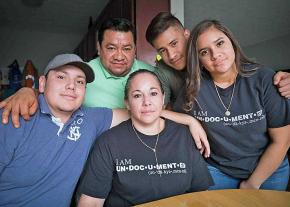Seeking sanctuary in Columbus
and report on an Ohio woman's brave defiance of ICE.
ICE WANTS to deport a 40-year-old mother of three who has lived more than half her life in the U.S., and most of that in Columbus, Ohio.
But Edith Espinal isn't going.
This month, she sought sanctuary at the Columbus Mennonite Church, whose congregation decided unanimously to continue a tradition of opening their doors to the victims of the U.S. government's immigration policy.
"Today, Columbus, Ohio, truly becomes a sanctuary city," Rubén Castilla Herrera, an organizer with the Ohio Interfaith Immigrant and Migrant Justice Coalition, told a crowd of people gathered at the church as Espinal arrived. "We need policy and legislation, but ultimately, sanctuary comes from the people."
Back in September, Espinal--who came to the U.S. from Mexico with her family when she was still a teenager--decided the risk of going to a check-in meeting at ICE headquarters was too great, and she took refuge in the church.
After a well-publicized press conference--which came the same day that the Trump administration announced it would cancel the Deferred Action for Childhood Arrivals (DACA) program--ICE seemed to relent, offering the option of applying to stay in the U.S. permanently. Espinal returned to her family.

But at the end of September, she learned at a meeting with ICE agents that the appeal had been denied. Espinal was presented with the choice of buying a plane ticket to Mexico or being taken into custody on the spot.
She bought a ticket on a flight leaving October 10, but the following week, Espinal returned to Columbus Mennonite Church, and she has been living there ever since.
Churches have historically been a site of sanctuary because ICE's policy--on paper, anyway--is to restrict its agents from locations deemed "sensitive," including places of worship, schools, medical treatment facilities and other public places. Under Trump, though, there are plenty of stories to show this policy isn't being honored.
The congregation of the Columbus church, with the support of activists and community members around Columbus, is vowing to protect Espinal. In the 1980s, the church offered refuge to those fleeing violence in Central America during the era of the U.S.-backed dirty wars.
JUST AS the Columbus Mennonite Church is no stranger to sanctuary, Edith Espinal is no stranger to political activism. According to Mijente.net, Espinal was among the DREAM30 activists who took part in a civil disobedience action at the U.S.-Mexico border to protest U.S. immigration policies. She has been in removal proceedings since.
Espinal and her family have spoken out for immigration reform, and she has worked with the Central Ohio Worker Center, Mijente.net reports. "Her and her family have been on the streets fighting, marching and speaking for immigrant justice. Now, it's time for us to show up her and her family."
ICE has tried to put pressure on Edith by targeting her son, Brandow Espinal Gonzalez, who is also undocumented.
Though the immigration court hearing on his status isn't due to take place until 2020, Brandow was being required to check in with ICE every two weeks. For each meeting, community members, faith leaders and activists met outside ICE headquarters in downtown Columbus to ensure his safety.
Last week, the Espinals and their supporters were able to celebrate a small victory--Brandow was told that he wouldn't have to check in with ICE again for another six months.
As family advocate Mohammad Abdollahi said. "This shows that the community support is really working, that ICE knows that this family has a lot of support, and there's a lot of people vying for them to be released and allowed to be reunited as a family."
Brandow was excited to tell his mother the good news in her sanctuary at the church. "So many times I've seen her cry, now I can see her smile, for now," he told a reporter. "They were using me to get to my mom."
NOW THE Espinal family and its supporters are hoping that the solidarity campaign connected to Edith's sanctuary will win justice.
The example of Javier Flores Garcia gives them hope. The Philadelphia man sought sanctuary to protect his family at the Arch Street United Methodist Church in early November of last year, fearing that deportation to Mexico was imminent.
This month, thanks to the efforts of his family and supporters, he was granted "deferred action" on the expulsion, which will let him live and work in the U.S. while awaits approval of his U visa, which protects victims of violent crimes like Garcia, who was stabbed in 2004.
Remaining in sanctuary can be difficult personally, because it means being away from family, work and the community. But Espinal is determined to stay for her family. "What would you do if you were forced to be separated from your family?" she said to one reporter. "I think that most people would do what they could to be with their children."
This is the path that Edith Espinal has chosen to take in Columbus, and it is also the choice of other immigrants, whether they seek refuge in a church or another "sensitive location;" whether public or private.
As community members, we must be able to provide these spaces and give support to our neighbors, regardless of their citizenship status.
The success stories of the sanctuary movement have lessons for us to draw in proposing options and safety to undocumented immigrants fearing deportations in the future. Awareness of these stories will impact the decisions of other immigrants facing the threat of deportation and being taken from their families. Since Edith Espinal's case came to a head, another person has chosen sanctuary in Ohio.
We need a grassroots mobilization to defend immigrants, uniting their struggle with those of Black and Brown communities against police brutality, of refugees, of Indigenous people and the victims of U.S. imperialism in all its forms.
Edith Espinal's strength and courage should inspire us and help us move forward.


